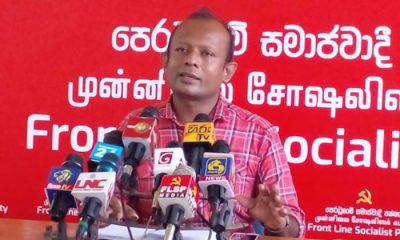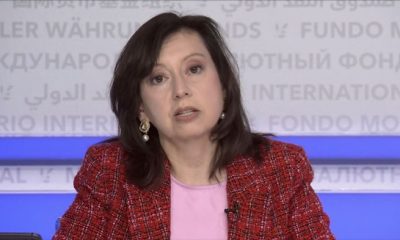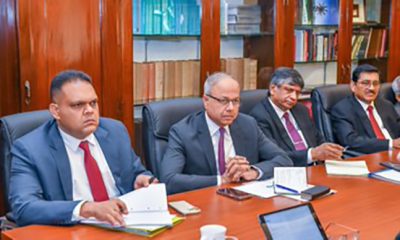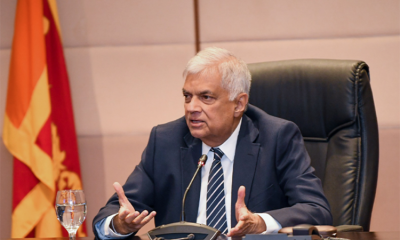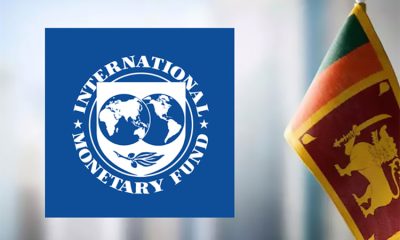News
IMF diagnostic on Lanka damning verdict – Harsha
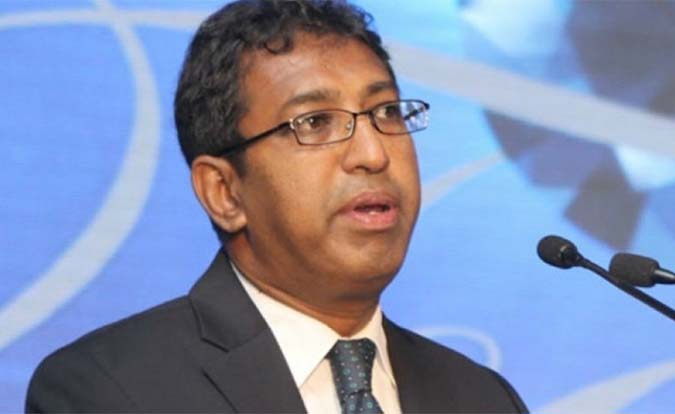
In a scathing indictment of Sri Lanka’s governance landscape, the International Monetary Fund (IMF) had handed down a damning verdict, Samagi Jana Balawegaya (SJB) MP Harsha de Silva told Parliament on Wednesday.
Discussing the contents of the IMF’s Governance Diagnostic Assessment report, he said that the IMF’s verdict was clear: corruption had eaten into all state institutions from top to bottom.
MP de Silva said that one of the main reasons for the delay in disbursing the second tranche of IMF funds was the shortfall in government revenue as well as the sluggish progress in foreign debt restructuring. However, perhaps the most significant roadblock to financial recovery lies in the government’s persistent failure to address its deep-rooted problem of corruption, he said.
The SJB MP urged the Sri Lankan government to swallow the bitter medicine it so desperately needs. With a history of approaching the IMF for assistance a staggering 16 times without lasting success, Sri Lanka now had to adopt comprehensive reforms. The government must seize the opportunity to eliminate corruption and pave the way for a meaningful change, Dr. de Silva said.
The IMF has laid out a rigorous 16-point plan, a blueprint for Sri Lanka’s revival. Those directives, while formidable in scope, were essential steps towards transparency and accountability, the MP said.
They include establishing an Advisory Committee by November 2023 to nominate commissioners for the Commission to Investigate Allegations of Bribery or Corruption (CIABOC).
Dr. de Silva said: “This committee will ensure that the nominations for key anti-corruption positions are not influenced by political interests, which is a critical step in tackling corruption.”
Another IMF recommendation is publishing asset declarations for senior officials by July 2024, an act that brings much-needed transparency, with only 12 out of 225 MPs having disclosed their assets.
“This move will shed light on potential conflicts of interest among top government officials, promoting accountability and integrity,” said Dr. de Silva.
The following are among the IMF recommendations: Enacting Crime legislation by April 2024 to align with international standards, combating money laundering and illicit financial activities, amending the National Audit Act to hold officials accountable for the use of public resources, finalising and implementing regulations for beneficial ownership information and creating a public registry by April 2024, publishing reports on increasing competitive tendered procurement contracts, targeting agencies with low levels of competition, requiring the publication of all public procurement contracts above LK 1 billion and other critical financial information on a designated website, implementing the State-Owned Enterprise Reform Policy to ensure ethical management, abolishing or suspending the Strategic Development Projects Office Act until a transparent process for evaluating proposals is established, and enacting a Public Procurement Law by December 2024, addressing the alarming procurement and corruption issues.
Harsha de Silva said: “It is quite evident the failure in procurement and corruption with the mess that’s going on in the Ministry of Health with emergency procurement but yet no action was taken. If one may recall what happened at COPF not too long ago, when a tax holiday was given to one company for 17 years, I asked only one question: What is the benefit or revenue generated to the government? But they were unable to answer that; they removed me as the Chair of the COPF. Now, the IMF has made it mandatory to reveal the cost of such tax holidays.”
MP de Silva said Sri Lankan citizens were struggling to make ends meet while corruption remained unchecked. Professionals were fleeing the country; public trust in the government was eroding and that the IMF’s intervention was not a burden but a blessing.
“The ball is now in the court of Ranil Wickremesinghe and his SLPP government. Opposition to these measures is not an option, as they represent the only viable path forward. The IMF’s directives are a lifeline, an opportunity for Sri Lanka to cleanse its system, regain trust, and pave the way for a brighter future,” Dr. de Silva said.
News
US sports envoys to Lanka to champion youth development

The U.S. Embassy in Colombo welcomed the U.S. Sports Envoys to Sri Lanka, former National Basketball Association (NBA) and Women’s National Basketball Association (WNBA) players Stephen Howard and Astou Ndiaye, from June 8 through 14.
The Public Diplomacy section of the U.S. Embassy said that it would launch a weeklong basketball program intended to harness the unifying power of sports, made possible through collaboration with Foundation of Goodness and IImpact Hoop Lab.
While in Sri Lanka, Howard and Ndiaye, both retired professional basketball players, will conduct a weeklong program, Hoops for Hope: Bridging Borders through Basketball. The Sports Envoys will lead basketball clinics and exhibition matches and engage in leadership sessions in Colombo and Southern Province for youth aged 14-18 from Northern, Uva, Eastern and Western Provinces, offering skills and leadership training both on and off the court. The U.S. Envoys will also share their expertise with the Sri Lanka Basketball Federation, national coaches, and players, furthering the development of basketball in the country. Beyond the clinics, they will collaborate with Sri Lankan schoolchildren to take part in a community service project in the Colombo area.
“We are so proud to welcome Stephen and Astou as our Sports Envoys to Sri Lanka, to build on the strong people-to-people connections between the United States and Sri Lanka,” said U.S. Ambassador Julie Chung. “The lessons that will be shared by our Sports Envoys – communication, teamwork, resilience, inclusion, and conflict resolution – are essential for leadership development, community building, equality, and peace. The U.S. Sports Envoy program is a testament to our belief that sports can be a powerful tool in promoting peace and unity.”
News
Rahuman questions sudden cancellation of leave of CEB employees

SJB Colombo District MP Mujibur Rahuman in parliament demanded to know from the government the reasons for CEB suspending the leave of all its employees until further notice from Thursday.
MP Rahuman said that the CEB has got an acting General Manager anew and the latter yesterday morning issued a circular suspending leave of all CEB employees with immediate effect until further notice.
“We demand that Minister Kanchana Wijesekera should explain this to the House. This circular was issued while this debate on the new Electricity Amendment Bill was pending. There are many who oppose this Bill. The Minister must tell parliament the reason for the urge to cancel the leave of CEB employees,” the MP said.However, Speaker Mahinda Yapa Abeywardena prevented Minister Wijesekera responding to the query and said that the matter raised by MP Rahuman was not relevant.
News
CIPM successfully concludes 8th Annual Symposium

The Chartered Institute of Personnel Management (CIPM) successfully concluded the 8th Annual CIPM Symposium, which took place on 31st May 2024. Themed “Nurturing the Human Element—Redefining HRM in a Rapidly Changing World,” the symposium underscored the pivotal role of human resource management (HRM) in today’s dynamic global landscape. Since its inception in 1959, CIPM has been dedicated to advancing the HR profession through education, professional development, and advocacy, solidifying its position as Sri Lanka’s leading professional body for HRM.
Ken Vijayakumar, the President of the CIPM, graced the occasion as the chief guest. The symposium commenced with the welcome address by the Chairperson, Prof. Arosha Adikaram, followed by the Web Launch of the Symposium Proceedings and Abstract Book by the CIPM President. The event featured distinguished addresses, including a speech by Chief Guest Ken Vijayakumar, President of CIPM, and an address by Guest of Honor Shakthi Ranatunga, Chief Operating Officer of MAS Holdings Pvt. Ltd., Sri Lanka.
The symposium also featured an inspiring keynote address by Prof. Mario Fernando, Professor of Management and Director of the Centre for Cross Cultural Management (CCCM) at the University of Wollongong, Australia.
Vote of Thanks of the inauguration session was delivered by Dr. Dillanjani Weeratunga, Symposium Co-chair.
The symposium served as a comprehensive platform for researchers to present their findings across a wide range of critical topics in HRM. These included Cultural Diversity and Inclusion, Talent Development and Retention, Ethical Leadership and Corporate Social Responsibility, Adapting to Technological Advancements, Mental Health and Well-being at Work, Global Workforce Challenges, Employee Empowerment, and Reskilling and Upskilling.
The plenary session was led by Prof. Wasantha Rajapakse. Certificates were awarded to the best paper presenters during the valedictory session, followed by a vote of thanks delivered by Kamani Perera, Manager of Research and Development.
The annual symposium of CIPM was a truly inclusive event, attracting a diverse audience that spanned undergraduates, graduates, working professionals, research scholars and lecturers. This widespread interest highlights the symposium’s significance in the field of HRM, offering a unique opportunity for everyone to network and learn from scholarly brains.The CIPM International Research Symposium was sponsored by Hambantota International Port, Sri Lanka Institute of Information Technology (SLIIT), E B Creasy & Co. PLC, and Print Xcel Company.


